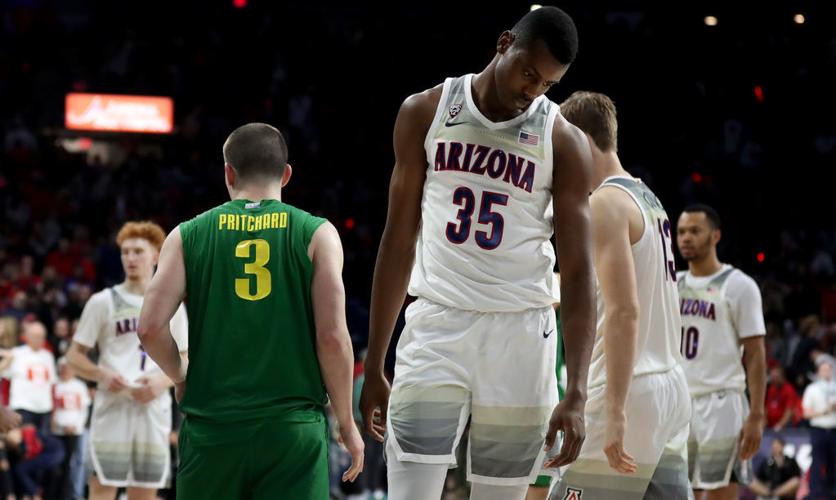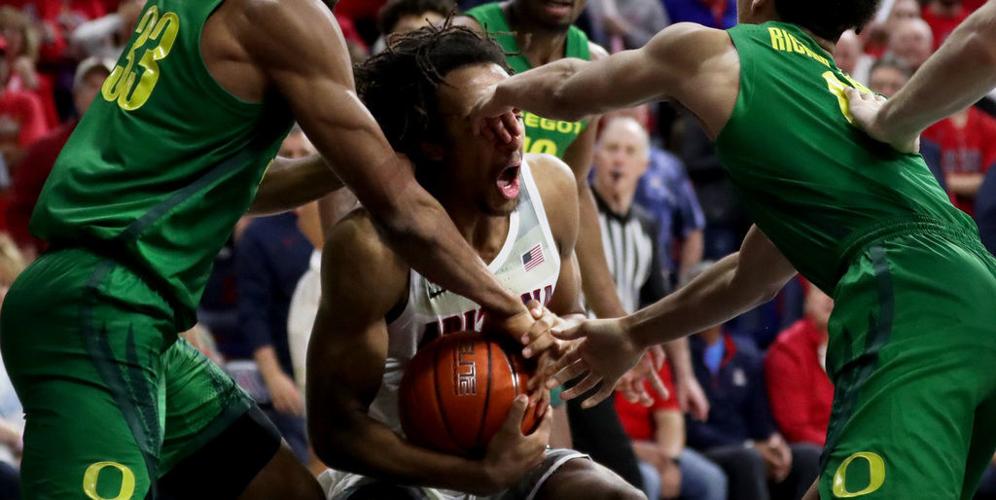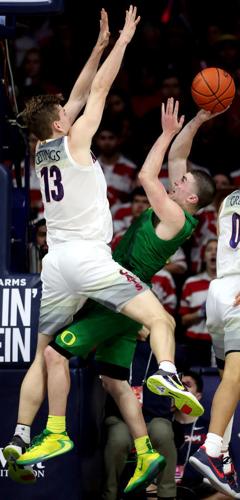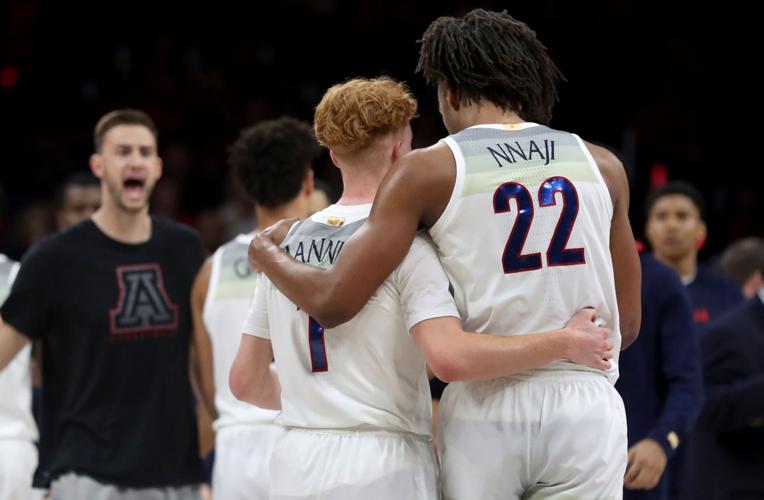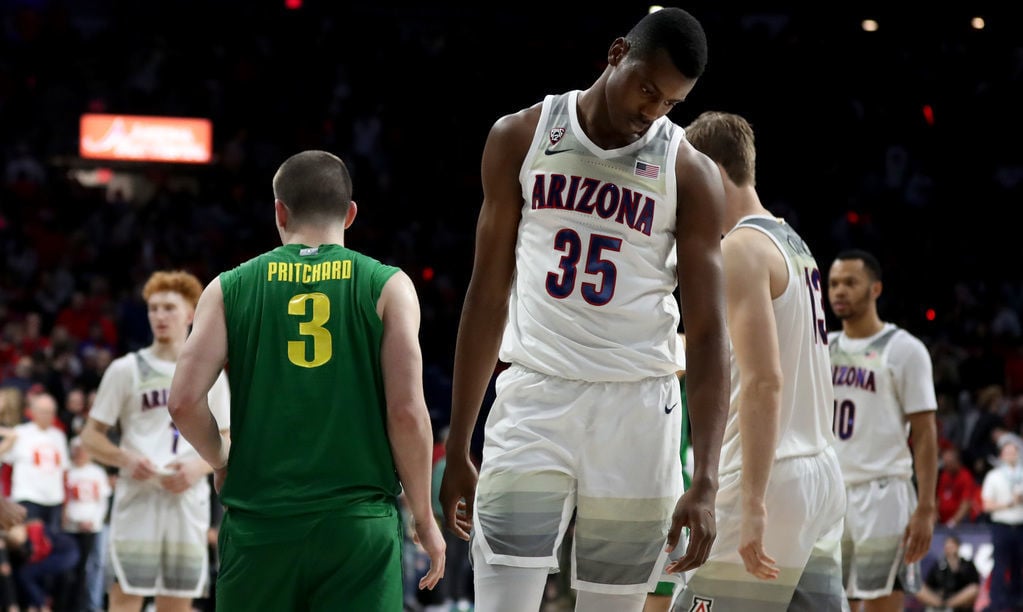To make the atmosphere of Saturday’s Arizona-Oregon game more provocative, the UA furnished red glow-in-the-dark sticks to fans at McKale Center.
Oddly, the school did not finish the job. It distributed glow-sticks only to those seated in the lower bowl, leaving about 4,000 nosebleed-seat fans wanting more.
Two hours later, as if on cue, the Wildcats failed to finish their job, too, losing 73-72 to the Ducks and the Pac-12’s most feared finisher, Payton Pritchard.
Such has been the 2019-20 season for Arizona.
It tiptoed to the edge of success against Baylor, Gonzaga, St. John’s, Arizona State and Oregon (twice) but each time couldn’t finish.
This happens mostly because Sean Miller’s team is full of freshmen, often timid and tentative in crunch time. Saturday’s crushing collapse to the Ducks defined a season that has lost its glow.
As a result, guess who’s in first place in the Pac-12?
Arizona State.
It’s true that Arizona beat Pepperdine on a last-second bucket by freshman Nico Mannion, but Pepperdine is 15-14 in a bad league. And the Wildcats beat Washington in the last minute on a Jemarl Baker 3-pointer, but the Huskies are 3-12 and in last place in the Pac-12.
It wasn’t what Oregon did on Saturday, it was what Arizona did not do.
It missed more than half of its foul shots. It failed to score after taking a 64-58 lead with 3:40 remaining in regulation. It put on a clinic on how NOT to win a close game. And although the Wildcat gave a dedicated and worthy defensive effort at guarding Pritchard, he scored 38 points.
Pritchard came off as a combination of UCLA’s Don MacLean, who scored 38 points at McKale to break Arizona’s 71-game home winning streak in 1992, and BYU’s Jimmer Fredette, who scored 49 points at McKale 10 years ago as BYU won by 30.
You usually don’t beat any team when a player like MacLean, Fredette or Pritchard has a career night, and that’s what made Saturday’s failure-to-finish so regrettable.

Arizona guard Nico Mannion (1), left, and forward Zeke Nnaji (22) head for the Wildcats huddle during a time out in the game against Oregon at McKale Center, February 22, 2020 Tucson, Ariz.
The Ducks are good, but they’re not special.
After all of the misplays leading to a final possession of regulation and overtime, all Arizona had to do to bury the Ducks in fifth place was make a couple of foul shots. Had either Josh Green or Christian Koloko — freshmen, for sure — been able to do that, Arizona and ASU would be tied atop the Pac-12.
It would have been the most captivating story in college basketball this week.
The thought of that unprecedented possibility was too good to be true, wasn’t it?
A few minutes after Koloko missed two foul shots, the UA pep band marched glumly down the corridor at McKale Center.
Oregon’s Shakur Juiston, who scored his team’s final nine points, all in overtime — talk about a finisher — was chatting with a few reporters about the “basketball gods.’’
“I might as well go play the lottery now,’’ he said with a smile.
By my reckoning, Koloko is the most popular man on Arizona’s basketball team. He is The Future, or at least the Hope for the future at McKale. Part of it is that he seems committed to a longer term of college basketball.
Part of it is that you can’t help but like his demeanor and admire the progress he has made since the Red-Blue game.
After missing his foul shots Saturday, Koloko walked through the hand-shaking ceremony with his head down, distraught.
He didn’t look up until Oregon coach Dana Altman stopped him at midcourt and essentially told him there will be better days ahead.

Arizona forward Stone Gettings (13) forces Oregon guard Payton Pritchard (3) into missing a short range jumper in their Pac12 game at McKale Center, February 22, 2020 Tucson, Ariz.
“It’s a tough spot for a freshman,’’ Altman said.
Sometimes the basketball gods can be fickle.
Altman talked about how the Ducks have now won four consecutive overtime games this season — yes, four— including impossibly difficult road games at Michigan, Washington and in Tucson. The Ducks don’t fade at the finish because they possess the one difference-maker that no one in the Pac-12 can match.
Payton Pritchard.
Pritchard was the only man on the court to play all 45 minutes. He wanted the ball. He dictated the flow of the game. He was always the aggressor, refusing to lose.
“He wouldn’t let me take him out,’’ said Altman. “I tried to a couple of times.’’
Pritchard established career-highs in scoring, 38, and 3-point attempts, 14. His foul-shooting alone, 8 for 8, was a crusher.
After fouling out in a dreadful loss Thursday at ASU, Pritchard said he came to Tucson wanting to “prove a point.’’
For 37 minutes, Arizona senior Dylan Smith played Pritchard in a war of wills, eye to eye and about as physical as college basketball refs allow you to play.
Smith was terrific, focused and hustling. It’s amazing Pritchard could score 38 points against that kind of resolve.
“But,’’ said the tireless Pritchard, “it probably makes him tired, too.’’
Pritchard has the green light of all green lights. Only a few Arizona players over the years had the same kind of freedom to shoot at will — Damon Stoudamire, for one, and maybe Jerryd Bayless.
“He needs to be The Man,’’ said Juiston, who made Oregon’s game-deciding basket with 1.4 seconds left. “And he has the leeway to do it.’’
Oh, what Arizona could do if it had “The Man.’’
Pritchard’s bursts to the basket created so many problems for Arizona’s defense, either scoring on a layup or dishing to an open teammate, that the final statistics sheet looked like it had a typo, crediting him for just four assists.
Predictably, Juiston said his game-deciding basket came as a result of “everyone collapsing’’ on Pritchard. This time, in the end, it was Arizona who collapsed. The hows and whys are no longer important because this week’s road trip to UCLA and USC is so potentially menacing it requires complete focus.
Before Altman left McKale Center he was asked about the Pac-12 pennant race.
“It’s a mess,’’ he said.
Arizona knows the feeling.

Arizona forward Zeke Nnaji (22) takes a hand in the face from Oregon guard Will Richardson (0) during a scrum under the basket in the second half of their Pac12 game at McKale Center, February 22, 2020 Tucson, Ariz.


